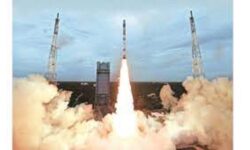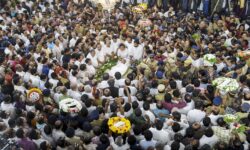NEW DELHI:
Public intellectuals worth their salt need to question, dissent and speak truth to power by becoming social gadflies in the manner of Socratic traditions as politics across the world is showing worrying signs of xenophobic nationalism, demagoguery and the ‘epidemic of conformism’ in the Age of Trump, says a prominent political thinker.
“This is an age of ‘Trumpization of politics’, an age of ignorance, arrogance and mediocrity. This is an age which has brought with it the rise of populist politicians and loudmouth demagogues around the world,” said Prof. Ramin Jahanbegloo, whose brush with fame includes a four-month solitary confinement in an Iranian jail on the charge of fomenting a Velvet Revolution in that country.
However, the rise of the demagogues is the symptom, not the cause of erosion of public trust and engagement. It can be said that citizenry is only realizable through active participation in the public sphere.
“But what is often lost in the debate is the role of intellectuals as agents to transform the public discourse and move the society toward new modes of thinking,” said Prof. Jahanbegloo, who is presently the Executive Director of the Mahatma Gandhi Centre for Nonviolence and Peace Studies and the Vice-Dean of School of Law at Jindal Global University, Delhi.
He was delivering the Daya Krishna Memorial Lecture on the topic, ‘The Role of the Intellectual in the Age of Trump’, organised by the Raza Foundation at India Habitat Centre here last evening. During his nearly hour-long lecture, he traced the role of intellectuals from the time of Socrates, Edward Said and Albert Camus to German Nobel laureate Thomas Mann and the present day world, and lamented how they are now abdicating their sense of humanism and critical responsibility.
“The 21st century represents in general a separation between intellectuals and the public space. Intellectuals are no more described as ‘super heroes of the mind’…. Today’s intellectuals have a fear of the political and it seems as if the political has also a terrible indifference to ‘intellectual’. In other words, intellectuals are losing their public authority and moral legitimacy of speaking truth to power,” he said.
Intellectuals become traitors when they are no more in a position to struggle against the inhumane because they feel too weak to unmask its destructive tendencies, he said. Casting aside the Socratic tradition, a good number of 20th century intellectuals willingly and openly served dictators like Hitler, Stalin and Pol Pot, he noted.
Prof. Jahanbegloo, a winner of the Peace Prize from the United Nations Association in Spain, said modern day intellectuals think that all moral truths are relative and there is no need to represent a moral voice in a voiceless world. Also, the intellectuals in the academia and other professional institutions are more concerned about career-making and salary.
“Salaried, tenured and pensioned, many intellectuals find themselves chained to the wheel of a respectable career and profession which grounds their capacity of critical mindedness. Quickly and unrepentantly forgetting their moral and political responsibilities, many intellectuals in today’s world have degraded and abandoned the idea of public sphere evolving into uncritical supporters of mass culture,” he said, adding that political and cultural experts and media pundits have replaced intellectuals as the sociological actors.
Taking a swipe at today’s media celebrities, he said they are engaged solely in discussing facts, dictated by the economic laws of the market or by the political decisions of governments. The rise of the post-industrial global village, dominated by media networks and technology-driven communication, has drowned critical voices and ‘completely paralyzed and rendered impotent’ the critical questioning of intellectuals.
“Society for an intellectual is a space of active questioning and unlimited interrogation in such a way that the questions of freedom, justice, equity and equality can always be posed anew and not taken for granted,” said the thinker, who has taught at the universities in Tehran and Toronto and has been a fellow at the Center for Middle Eastern Studies at Harvard University,
Citing the instance of Socrates, he said the Athenian philosopher and gadfly questioned the judges who condemned him to death, and thus began the history of political thought with an act of intellectual questioning. This idea of “dissent” is the key feature to the existential presence of the intellectual in all times.
The acid test for an intellectual is to enter in the public sphere, attacking injustice, prejudice and intolerance. Intellectuals are not only individual thinkers, but also public servants of humanity who must question and reflect to protect societies from turning toward demagogy, populism and tyranny.
In the age of Trumpisation of politics, intellectuals cannot afford passive intellectualism and intellectual elitism; they must show the appetite for dissent and critical thinking as the society needs Socratic rebels to confront global challenges, he emphasized. “The idea of ‘dissent’ is the key feature to the existential presence of the intellectual in all times…. Intellectuals will certainly be useful to human societies, as long as humans continue to believe that “doubt” is not a futile word,” said the thinker.




